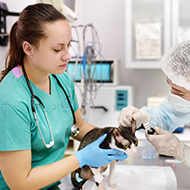Vets respond to legislative reform plans

The BVA and BVNA has responded to an RCVS Council vote to proceed with legislative reform proposals.
The BVA and the BVNA have expressed concerns over an RCVS Council decision to move forward with legislative reform proposals.
In a statement, the organisations stress that some of the key points in the legislation ‘do not support the overall aim of developing the College as a compassionate regulator.’
Namely, these include proposals for the RCVS to have powers of entry to support a mandatory practice standards scheme, the establishment of a Charter Case Protocol and the introduction of limited licensure for UK graduates with disabilities.
BVA response
BVA president James Russell said: “This is the culmination of a huge amount of work. Although we broadly welcome the direction of travel on legislative reform, we are concerned that a number of decisions risk undermining the College’s stated aim to develop as a compassionate regulator.
“On powers of entry, we don’t believe the case has been made and there’s a genuine danger that it could erode confidence in a system that vets should be supported and encouraged to engage with. And on proposals to deal with minor transgressions, we cannot support a system that will publicly name and shame veterinary professionals.
“As the reform plans progress it’s essential that there is ongoing engagement with the veterinary professions to feed in these concerns and help shape a future regulatory system that is proportionate and fair.”
BVNA response
Jo Oakden, BVNA president, said: “There’s a huge amount to welcome in these regulatory proposals, particularly the commitment to protecting the veterinary nurse title, which BVNA has long championed.
“However, we question some of the decisions, such as introducing limited licensure, which is an inappropriate and potentially discriminatory way for disabled students to meet day one competencies.
“As the proposals are developed into new legislation it’s important that the veterinary and nursing professions are fully engaged and have the opportunity to input so that we can all have confidence in our regulatory and disciplinary processes.”
RCVS response
In its response, the RCVS said that it was ‘disappointed’ in the comments set out by the BVA and BVNA and outlined what it said to be some of the ‘inaccuracies and misunderstandings'.
Dr Mandisa Greene, RCVS President, said: “We find the characterisation of the new Charter Case Protocol as ‘public shaming’ needlessly inflammatory and scaremongering, as well as inaccurate. As we have made clear, this protocol will exist as an alternative to holding stressful, expensive and time-consuming Disciplinary Committee hearings for veterinary surgeons and veterinary nurses whose cases meet the threshold for a hearing but would be likely to attract a lesser sanction.
"It would not, as has been suggested, lead to the RCVS publishing the details of those guilty of ‘minor transgressions’ that would have otherwise been closed by the Preliminary Investigation Committee.”
On the subject of powers of entry, Dr Greene said: “We have made it clear that this would be used proportionately and generally only as a last resort where a practice has declined all voluntary requests for us to conduct a visit. If we are to have a mandatory practice standards scheme in the future, the very least that the public would expect is that the regulator that upholds these standards would have the appropriate and requisite powers to support it.”
Regarding limited licensure, Mandisa said: “Our proposals are intended to widen access to the veterinary professions, by allowing people who cannot currently fulfil all the criteria of the current Day One Competences, due to physical and/or other disabilities, the chance to fulfil their potential by entering vet school and becoming qualified veterinary surgeons.
“While there would be certain restrictions on areas of their practice after they qualify, there is no suggestion that this would result in a two-tier system, and we would look to the veterinary and veterinary nursing associations to support positive and inclusive culture so that this would not become the case. At present, people with such disabilities cannot become vets at all, which we feel presents a significant loss to the professions and society as a whole.”



 FIVP has shared a survey, inviting those working in independent practice to share their views on the CMA's proposed remedies.
FIVP has shared a survey, inviting those working in independent practice to share their views on the CMA's proposed remedies.